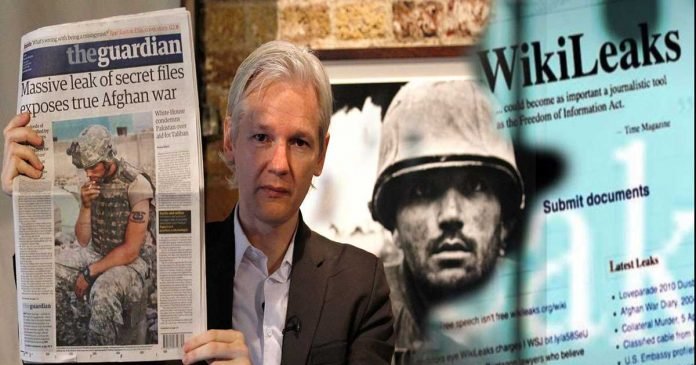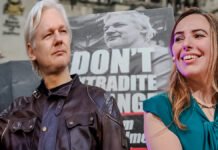After years of silence, outlets to publish WikiLeaks material, including the Guardian, come together to oppose the prosecution of Julian Assange
The outlets have demanded the US government must drop its prosecution of the WikiLeaks co-founder Julian Assange because it is undermining press freedom, according to the media organisations that first helped him publish leaked diplomatic cables.
Twelve years ago today, the Guardian, the New York Times, Le Monde, Der Spiegel, and El País collaborated to release excerpts from 250,000 documents obtained by Assange in the “Cablegate” leak. The material, leaked to WikiLeaks by the then American soldier Chelsea Manning, exposed the inner workings of US diplomacy around the world.
The editors and publishers of the media organisations that first published those revelations have come together to publicly oppose plans to charge Assange under a law designed to prosecute first world war spies.
There have been some very awkward questions asked about Julian Assange’s incarceration. Ken Loach made some very important observations during a video appeal that asked why the Guardian had stayed so silent, he also called into question Sir Keir Starmer’s part in Julian Assange’s incarceration indicating the Swedish cables relating to the case.
It was while Starmer was head of the DDP the CPS appealed a decision from a lower court to release Julian Assange on bail. Starmer advised lawyers from Sweden (investigating accusations of rape) not to question Assange in Britain. And leaked emails show that, when they expressed doubts about the case, Starmer’s office replied: “Don’t you dare get cold feet.”
“Publishing is not a crime,” they said, saying the prosecution is a direct attack on media freedom.
The letter comes as Assange, the founder and publisher of WikiLeaks, is fighting the U.S. government’s attempt to extradite him to face charges of violating the draconian Espionage Act of 1917. If found guilty on all counts, Assange would face a prison sentence of up to 175 years for publishing classified information—a common journalistic practice.
Press freedom organisations have vocally warned that Assange’s prosecution would pose a threat to journalists the world over, a message that the five newspapers echoed in their letter Monday.
Despite dire warnings from rights groups, the Biden administration has decided to continue pursuing Assange’s extradition and prosecution.
In June, the United Kingdom formally approved the U.S. extradition request even after a judge warned extradition would threaten Assange’s life.
Assange’s legal team filed an appeal in August, alleging that the WikiLeaks founder is “being prosecuted and punished for his political opinions.”
Great to see this support from the 5 newspapers that partnered with @wikileaks on Cablegate. Assange’s extradition & prosecution would set a dangerous precedent that could apply to any journalist or publisher. It’s time to drop the charges & #FreeAssange! https://t.co/kUTdsr3C2z
— Rebecca Vincent (@rebecca_vincent) November 28, 2022
The full letter sent by the media organisations
Publishing is not a crime: The US government should end its prosecution of Julian Assange for publishing secrets.
Twelve years ago, on November 28th 2010, our five international media outlets – the New York Times, the Guardian, Le Monde, El País and Der Spiegel – published a series of revelations in cooperation with WikiLeaks that made the headlines around the globe.
“Cablegate”, a set of 251,000 confidential cables from the US state department, disclosed corruption, diplomatic scandals and spy affairs on an international scale.
In the words of the New York Times, the documents told “the unvarnished story of how the government makes its biggest decisions, the decisions that cost the country most heavily in lives and money”. Even now in 2022, journalists and historians continue to publish new revelations, using the unique trove of documents.
For Julian Assange, publisher of WikLeaks, the publication of “Cablegate” and several other related leaks had the most severe consequences. On April 12th 2019, Assange was arrested in London on a US arrest warrant, and has now been held for three and a half years in a high-security British prison usually used for terrorists and members of organised crime groups. He faces extradition to the US and a sentence of up to 175 years in an American maximum-security prison.
This group of editors and publishers, all of whom had worked with Assange, felt the need to publicly criticise his conduct in 2011 when unredacted copies of the cables were released, and some of us are concerned about the allegations in the indictment that he attempted to aid in computer intrusion of a classified database. But we come together now to express our grave concerns about the continued prosecution of Julian Assange for obtaining and publishing classified materials.
The Obama-Biden administration, in office during the WikiLeaks publication in 2010, refrained from indicting Assange, explaining that they would have had to indict journalists from major news outlets too. Their position placed a premium on press freedom, despite its uncomfortable consequences. Under Donald Trump however, the position changed. The DoJ relied on an old law, the Espionage Act of 1917 (designed to prosecute potential spies during world war one), which has never been used to prosecute a publisher or broadcaster.
This indictment sets a dangerous precedent, and threatens to undermine America’s first amendment and the freedom of the press.
Obtaining and disclosing sensitive information when necessary in the public interest is a core part of the daily work of journalists. If that work is criminalised, our public discourse and our democracies are made significantly weaker.
Twelve years after the publication of “Cablegate”, it is time for the US government to end its prosecution of Julian Assange for publishing secrets.
Publishing is not a crime.
The editors and publishers of:
The New York Times
The Guardian
Le Monde
Der Spiegel
El País
Support Independent Journalism Today
Our unwavering dedication is to provide you with unbiased news, diverse perspectives, and insightful opinions. We're on a mission to ensure that those in positions of power are held accountable for their actions, but we can't do it alone. Labour Heartlands is primarily funded by me, Paul Knaggs, and by the generous contributions of readers like you. Your donations keep us going and help us uphold the principles of independent journalism. Join us in our quest for truth, transparency, and accountability – donate today and be a part of our mission!
Like everyone else, we're facing challenges, and we need your help to stay online and continue providing crucial journalism. Every contribution, no matter how small, goes a long way in helping us thrive. By becoming one of our donors, you become a vital part of our mission to uncover the truth and uphold the values of democracy.
While we maintain our independence from political affiliations, we stand united against corruption, injustice, and the erosion of free speech, truth, and democracy. We believe in the power of accurate information in a democracy, and we consider facts non-negotiable.
Your support, no matter the amount, can make a significant impact. Together, we can make a difference and continue our journey toward a more informed and just society.
Thank you for supporting Labour Heartlands












